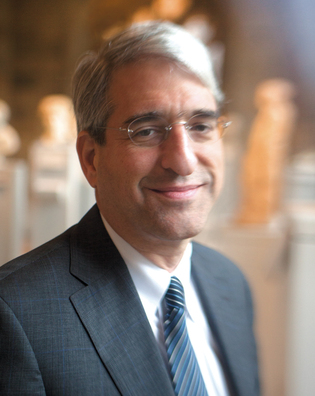 loading
loading
Q&A: Peter SaloveyStarting the jobPeter Salovey's thoughts on beginning his presidency.  Mark OstowView full imageY: As you begin your presidency, what are you most looking forward to? S: It is thrilling and humbling to be asked to be Yale’s president. I follow a very successful president, and that is a gift. It allows us to think about how to make Yale an even stronger institution. As alumni know, I’ve been organizing my thinking about Yale around four themes—a more unified Yale, a more innovative Yale, a more accessible Yale, and a more excellent Yale. What I’m especially looking forward to is working with the Yale community—alumni, students, staff, faculty—in striving toward those four goals. The goals themselves are exciting, but the collaborative process ahead feels thrilling. And also, as someone who has lived in New Haven and been at Yale for 32 years, I’m looking forward to working with the next mayor of New Haven to advance our city and to build on the excellent progress we have made together in the past 20 years on home ownership, on the retail vitality around campus, and on the progress with the public schools. I want to continue those efforts and add a focus on economic development—promoting the entrepreneurial activities of our students in the city of New Haven and enlisting alumni to bring business to New Haven with ultimately a focus on job creation. And I am very much looking forward to the Saturday prior to Thanksgiving, when we will beat Harvard in The Game. Y: What are your biggest worries? S: I begin this position with great optimism, hope, and excitement, and I don’t like to dwell on worries. But I do have a significant concern about the climate for higher education. Sequestration, for example, has led to constraints on research funding, which could inhibit the kind of basic and applied research that underlies the scholarship of great research universities like Yale and that drives the improvement of the economy and of the human condition. I also worry about the cost to families of higher education. Yale has worked very hard to reduce those costs, primarily through an aggressive financial aid program, but not all institutions can do so. And I worry about job markets for graduates at all levels. I would say, however, that these worries represent an opportunity. We must ask how Yale can be a leader. What can we do as a responsible university? What can I do as the president of this university? We need to help seek and disseminate solutions. Y: Another issue of concern is Yale’s budget. S: Yale’s budget challenges are being driven by the larger US economy at the moment. The national economic downturn in 2008 and 2009 directly affected our endowment, and we had to make major adjustments in the operating and capital budgets of the university. Our alumni, parents, and friends have been very generous during this period with their gifts to the university. That and the outstanding stewardship of our endowment by David Swensen [’80PhD] and his team have led to significant recovery. That said, the campus community also worked very hard to close the gap between the amount of money we would have been spending from the endowment and the amount of money we can now spend from the endowment. Over the last three-plus years, we made six-sevenths of the adjustment we need to make. There’s still one-seventh left. That is, we have to reduce the university budget by $40 to $50 million. It is entirely doable. But it is going to require continued prudence and attention. The encouraging part is that if we can address that situation—far smaller than the one we faced three or four years ago—we will position the university to take on new initiatives that will propel Yale in the years ahead. Y: You’ve done listening tours of the campus, and you created a website for all members of the Yale community to send you messages. Have you heard anything striking? S: In the last several months, I’ve spoken to groups of alumni all over the world. I’ve received hundreds of suggestions through my website. At this point I’ve heard from thousands of people, and what strikes me is how engaged our community is. When I start a conversation with my four themes, people immediately resonate with ideas of their own. Our community especially seems to like the idea of a Yale that is more than a confederation of great schools, departments, and programs—that is, rather, a university where we can bring together these wonderful pieces and create new opportunities for scholarship and teaching that exist in few, or perhaps no, other places. What’s been inspiring is how passionate and intelligent our community is in their thoughts about Yale and in their aspirations for Yale’s future. I like that. As a psychologist, I have studied the relationship between passion and reason, and I argue that being passionate and committed does not mean you’re not also reasonable and rational. And as I assume the greatest position of trust imaginable, as Yale’s president, I promise to do all I can to advance our beloved institution—by being as passionate and committed as any about this place and being reasonable about how we can accomplish our objectives.
The comment period has expired.
|
|